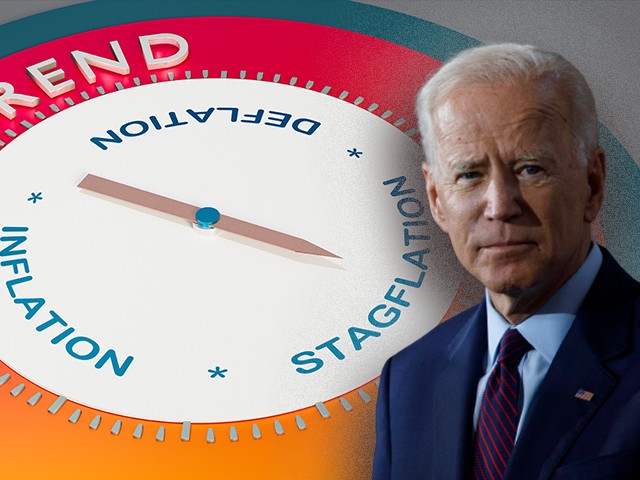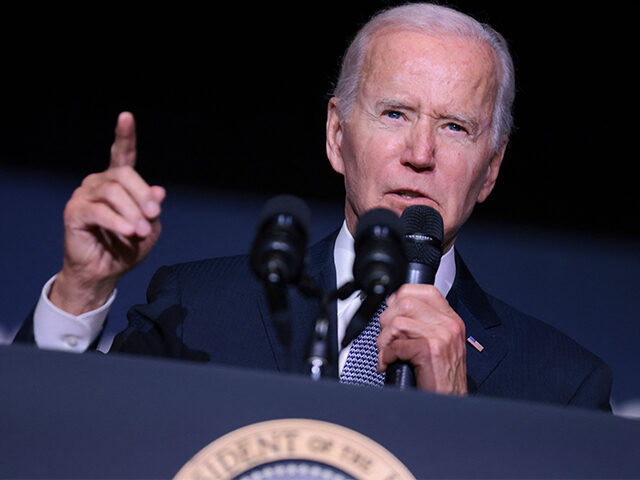After getting caught flat-footed on inflation, the Biden administration is determined not to be caught off-guard on the recession. Instead of trying to stave off a downturn, however, it appears to be trying to pre-blame Republicans for it.
Last week, for example, President Joe Biden warned that if Republicans seize the congressional majority in next month’s midterm elections, they will “crash the economy.” In particular, Biden argued that Republican attempts to use the debt ceiling to push for lower spending would damage the economy. “If you’re worried about the economy, you need to know this Republican leadership in Congress has made it clear they will crash the economy next year by threatening the full faith and credit of the United States,” Biden said from White House.
In reality, the economy is almost certainly going to slump next year regardless of which party runs the House of Representatives or the Senate. The Wall Street Journal’s latest survey of economists found that on average economists put the probability of a recession in the next 12 months at 63 percent. That’s up from 49 percent in the July survey. It is the first time the survey has put the probability above 50 percent since July 2020. An economic model run by Bloomberg Economics recently registered a looming recession as a 100 percent probability. The Conference Board’s leading economic indicators point to a recession by the end of this year.
President Biden, of course, has long lived in a kind of Democratic fan fiction version of the economy where inflation is transitory and slight, China poses no significant economic challenges, and growth is “strong as hell.” This imagined economy bears almost no resemblance to reality, but the Biden administration has repeatedly shown an impressive immunity to evidence. Fortunately, the American people have not fallen prey to the administration’s illusionists. The most recent poll from the Economist and YouGov showed that 78 percent of Americans think the economy is fair to poor, with just one percent saying it is in excellent shape.
One question is how bad the downturn will get. Most economists say that we are in for only a mild recession. The stock market, which just had its best week in months, does not seem to be pricing in a severe contraction. Federal Reserve officials have warned of “pain” but seem confident they can keep the economy from crashing too hard by easing off on the pace of rate increases and then allowing the Fed Funds target to sit somewhere around 4.5 percent for the rest of the year.

(iStock, Tom Brenner/Getty Images, BNN)
Not everyone is so sanguine. In a recent interview with the Bloomberg podcast Odd Lots, Nouriel Roubini predicted that central banks here and around the world would back off of tightening next year because the economic contraction would be worse than expected. “First of all it’s not going to be a short and shallow recession, it’s going to be ugly and then you’ll have financial stresses and a financial and a debt crisis,” Roubini said. “At that point they’re going to wimp out. And wimp out actually worse than the ’70s.” The result will be not just inflation, not just stagflation, but “a stagflationary debt crisis.” You can see why he’s often called “Dr. Doom.”
Our friend Larry Kudlow of the Fox Business Network likes to remind us that “the cavalry are coming.” He means that voters in November are going to send Republican majorities to Capitol Hill to relieve the country of the burden of one-party rule by Democrats. Unfortunately, they’ll almost certainly be arriving too late to turn the economy around before next year’s slump.
Later this week, the Commerce Department will deliver one last opportunity for the Biden administration to attempt to convince the American people that the Democrats are not incompetent stewards of the national economy. This will come in the form of the first look at GDP for the third quarter. It’s very likely that the economy grew in the third quarter after shrinking in the first and second. Falling gas prices likely freed up consumer spending outside of gas stations, and better trade figures will flatter growth. The Atlanta Fed’s GDPNOW model has the economy growing at a 2.9 percent pace.
Given their track record, Biden administration officials will likely claim credit for a turnaround and point to the growth as proof that they were right all along when they said the economy was “strong as hell.” We except this will not resonate because people will understand that even a good number for the third quarter will not be the start of a lasting turn toward growth but rather a temporary respite in an economy that is already tumbling toward recession.

COMMENTS
Please let us know if you're having issues with commenting.